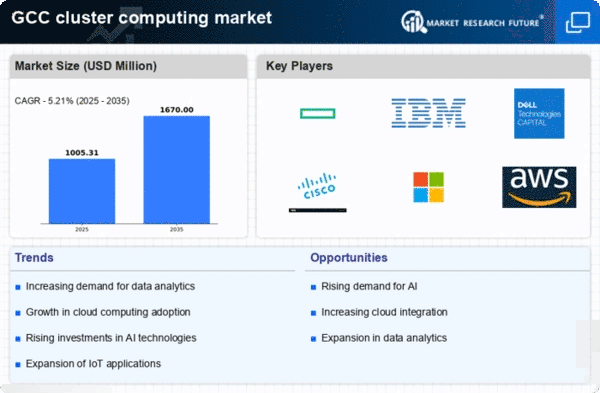Rising Demand for Data Processing
The cluster computing market is experiencing a notable surge in demand for efficient data processing capabilities. As organizations in the GCC region increasingly rely on data-driven decision-making, the need for robust computing solutions becomes paramount. This trend is particularly evident in sectors such as finance and healthcare, where large volumes of data require rapid analysis. According to recent estimates, the data analytics market in the GCC is projected to grow at a CAGR of 25% through 2026, driving the adoption of cluster computing solutions. The ability to process vast datasets quickly and accurately positions cluster computing as a vital component in meeting the evolving needs of businesses. Consequently, this rising demand for data processing is likely to propel growth within the cluster computing market, as companies seek to enhance their operational efficiency and competitive edge.
Cost Efficiency and Resource Optimization
Cost efficiency remains a critical driver for the cluster computing market, particularly in the GCC region where organizations are increasingly focused on optimizing their IT expenditures. By leveraging cluster computing solutions, businesses can maximize resource utilization and minimize operational costs. This approach allows for the consolidation of hardware resources, leading to reduced energy consumption and lower maintenance expenses. Reports indicate that companies utilizing cluster computing can achieve up to 30% savings in operational costs compared to traditional computing methods. As organizations strive to enhance their profitability, the emphasis on cost-effective computing solutions is likely to stimulate further investment in the cluster computing market. This trend underscores the importance of resource optimization in driving the adoption of cluster computing technologies across various industries.
Increased Focus on Cybersecurity Measures
The cluster computing market is increasingly influenced by the heightened focus on cybersecurity measures within organizations. As cyber threats become more sophisticated, businesses in the GCC region are prioritizing the protection of their data and IT infrastructure. This trend is leading to a greater demand for secure computing environments, where cluster computing solutions can play a crucial role. By enabling the deployment of robust security protocols and monitoring systems, cluster computing technologies help organizations safeguard their sensitive information. Reports suggest that the cybersecurity market in the GCC is expected to reach $5 billion by 2026, reflecting the growing importance of security in IT investments. This increased focus on cybersecurity is likely to drive further adoption of cluster computing solutions, as organizations seek to enhance their resilience against cyber threats.
Advancements in High-Performance Computing
Advancements in high-performance computing (HPC) are significantly influencing the cluster computing market. The GCC region is witnessing a surge in investments aimed at enhancing computational capabilities across various sectors, including research, engineering, and scientific applications. The demand for HPC solutions is expected to grow as organizations seek to solve complex problems that require substantial computational power. Recent data indicates that the HPC market in the GCC is projected to grow at a CAGR of 20% over the next five years. This growth is likely to drive the adoption of cluster computing technologies, as they provide the necessary infrastructure to support HPC applications. Consequently, the advancements in HPC are expected to play a pivotal role in shaping the future of the cluster computing market.
Growing Interest in Cloud Computing Solutions
The cluster computing market is witnessing a growing interest in cloud computing solutions, which offer scalable and flexible computing resources. In the GCC region, businesses are increasingly adopting cloud-based services to enhance their operational capabilities. This shift is driven by the need for agility and the ability to respond quickly to market changes. The cloud computing market in the GCC is expected to reach $10 billion by 2025, indicating a robust growth trajectory. As organizations migrate to cloud environments, the integration of cluster computing technologies becomes essential for managing workloads efficiently. This trend suggests that the cluster computing market will benefit from the increasing reliance on cloud solutions, as companies seek to leverage the advantages of both technologies to improve their overall performance.

















